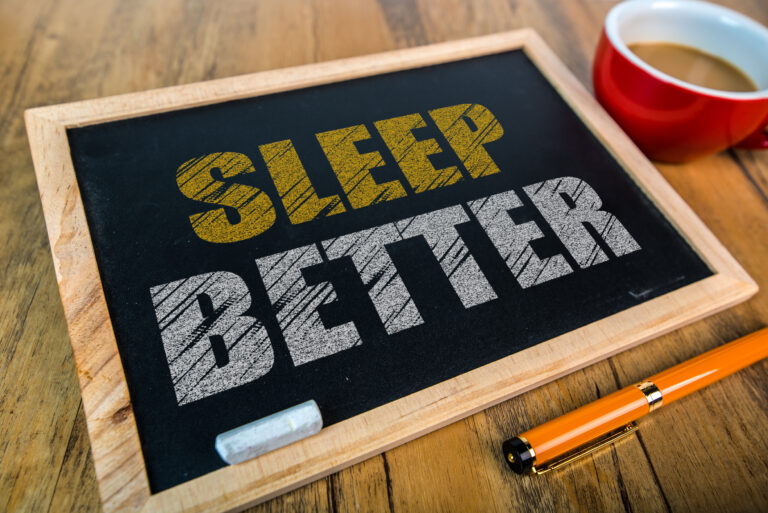We all have memories of falling asleep as soon as our heads touch the pillow, sleeping like a rock, and then waking up completely refreshed and ready for the day. Unfortunately for some of us, those memories began and ended in childhood, or somewhere in our early adulthood! The good news is that we can once again attain deep and refreshing sleep. The bad news? The keys to a good night’s sleep can be surprisingly complex. Beyond some of the obvious sleep tips, here are seven sleep secrets to start you off on your return journey to the Land of Nod:
1) Let go of the stress. When you are stressed, you produce an important “fight or flight” hormone called cortisol, that shuts down your sleep and circadian rhythm. Cortisol actually changes the electrical activity in areas of the brain that regulate our emotions, memory, and sleep–leading to decreased REM sleep, as well as mood swings and memory loss. So make the effort, and start with small steps: turn off the TV one to two hours before sleep, read a calming book, do some yoga, stretching or meditation–anything to give your body the cue that it’s time to relax.
2) Cut out or significantly reduce caffeine, alcohol, and sugar. These stimulants cause a surge in the “fight or flight” hormone mentioned above, and over time significantly weaken your adrenal glands. Especially daily consumption of stimulants lead to patterns of disturbed sleep– typically waking at 2 to 3am with or without the ability to fall back asleep. If not corrected, over time this pattern will inevitably take a downturn into a worse phase of chronic exhaustion.
3) Eat some protein or fat. Are you not particularly stressed, but still waking up routinely in the middle of the night? This is likely a blood sugar issue. If you are someone who typically gets “hangry”, or dizzy/lightheaded if you skip a meal, then this could be your problem. The simple solution is to eat some protein and/or fat thirty minutes before bed. Be careful not to eat carbohydrates or sugary snacks, as these will make your problem worse.
4) Take care of your hormones. Many women stop sleeping well a week before they get their period. Even more commonly, perimenopausal and menopausal women will experience poor quality sleep, as a result of fluctuating and dropping hormone levels. This is actually not normal, and points to deeper health issues. If this is happening to you, it is important to work with a holistic health care practitioner to naturally rebalance your hormones. Beware of biohormone therapy which, while temporarily helping you sleep better, can end up worsening long-term hormone health.
5) Limit the fluids. Waking to urinate in the night is not only annoying, but can lead to chronic patterns of insomnia. The obvious immediate experiment is to limit all fluids at least 4-5 hours before bed. If this doesn’t work, further detective work may be required. Other potential causes include worsening kidney function, weakening of the ligaments holding the bladder in place (typically after childbirth), and chronic inflammatory conditions that affect an antidiuretic hormone secreted by the pituitary gland.
6) Check for sleep apnea. Urinating in the night can also be a red flag for sleep apnea, a condition where a person stops breathing as often as several times a minute in the night. People with sleep apnea will often snore (although not always), and will feel chronically tired despite seemingly getting plenty of sleep at night. As sleep apnea is a serious condition with long term detrimental effects, it’s important that you seek a diagnosis from a qualified doctor, and address the issue as soon as possible.
7) Lower the EMF’s. I believe electromagnetic radiation is a vastly underestimated cause of all kinds of inflammatory processes, and especially to disrupted sleep. EMF’s emanate from your electrical, computer, and cell phone devices, from power lines and wifi. EMF’s cause a constant physiological stress on a cellular level; studies have shown exposure leads to high levels of prolonged oxidative stress. Seek ways to reduce your home and office EMF’s, but you can start by turning off your cell phone and home wifi systems at night.
There are more potential causes of insomnia, which is a topic far too large for our purposes here. At Vital Health, we have developed a highly effective evaluation process, the Complete BioFunctional Analysis, that allows us to identify the underlying causes and develop a plan to resolve them. When you are able to identify the causative factor(s), you then have the power to find a solution.
©2021 Darcy Greenwald, M.S.O.M., L.Ac. and Vital Health







